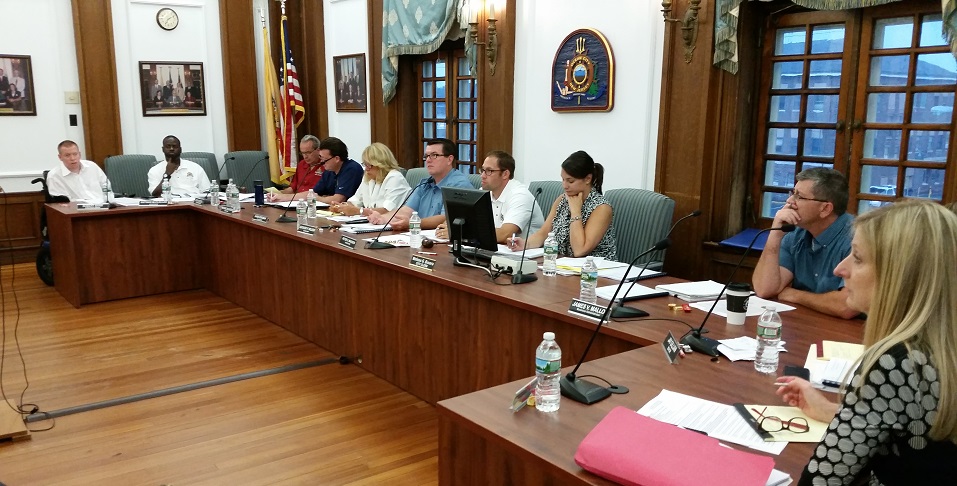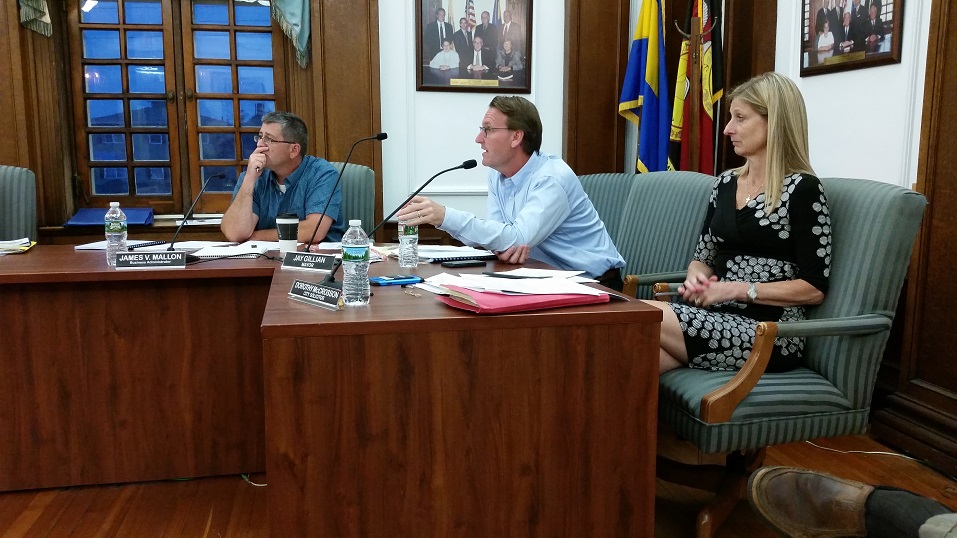Mayor Jay Gillian, center, explains that the city plans to use money from the bond ordinance to fix sinking sidewalks in the downtown business district.
 By Donald Wittkowski
By Donald Wittkowski Mayor Jay Gillian, center, explains that the city plans to use money from the bond ordinance to fix sinking sidewalks in the downtown business district.
The mayor stressed that one important component of the project will be to fix downtown sidewalks that have been sinking, which has created a tripping hazard for pedestrians. Not mincing words, Gillian called it a "dangerous" situation.
"It's a mess down there in some places," he said.
In other business Thursday, Council approved a $7 million contract that will help speed up the dredging of the city's shallow lagoons.
Under the contract, Mount Construction Co. Inc., of Berlin, N.J., will haul away muddy silt that is stored at a temporary disposal site after it is dredged from the lagoons and channels along the back bays.
A new temporary roadway has been built through the marshlands to allow more trucks to remove the dredge spoils from Site 83, as it is known. The disposal site, located off Roosevelt Boulevard near the 34th Street Bridge, holds 300,000 cubic yards of dredge material.
Gillian has proposed spending a total of $20 million on dredging projects along the bayfront. The contract with Mount Construction will help create enough space in Site 83 to keep the dredging projects moving along smoothly.
Also at Thursday's meeting, Council gave final approval to a zoning ordinance that will regulate the hours for pile-driving machinery at construction sites.
Gillian explained the ordinance will help property owners who are struggling to repair or rebuild homes damaged by Hurricane Sandy in 2012.
The measure expands the operating hours for the quieter and less disruptive pile drivers that use a boring or auger method.
However, the noisy, old-fashioned pile hammers that are infamous for their groundshaking vibrations would continue to face the same restrictions as they do now.
Currently, all pile driving, no matter what the method, is limited to 10 a.m. to 3 p.m. Monday through Friday from July 1 to Aug. 31, City Solicitor Dorothy McCrosson said.
Under the new regulations, the operating hours for pile drivers using the boring or auger method would be expanded to 8 a.m. to 4 p.m. Monday through Friday year-round.
There would continue to be a ban on all pile driving, no matter what type, on weekend days, according to McCrosson.
Contractors who use the boring or auger machines would have to notify surrounding property owners within 100 feet of the construction site at least 10 days in advance of starting work.
If they planned to use the hammer-type pile drivers, they would have to notify property owners within 200 feet and at least 14 days in advance.
One resident, Wayne Mozzo, of Pleasure Avenue, urged Council to extend the notification requirement to 200 feet for all types of pile driving. He said 100 feet simply isn't enough, especially when it involves noisy and potentially disruptive construction.
"As a full-time resident, I would like to know about this disruption more than 100 feet away," Mozzo said.
Council members, though, said they thought the pile-driving ordinance includes enough protective measures for residents. They left the 100-foot notification requirement for the auger or boring pile-driving equipment in place.
"I'm comfortable with what we've done here," Council Vice President Tony Wilson said.
McCrosson explained that the ordinance reflects changes in the pile-driving industry. The hammer-type pile drivers are becoming less common, while the quieter boring and auger equipment is now used more often, she said.
Wilson noted that local contractors have told him that the hammer pile drivers haven't been used in Ocean City for years, except for bulkhead construction.
Mayor Jay Gillian, center, explains that the city plans to use money from the bond ordinance to fix sinking sidewalks in the downtown business district.
The mayor stressed that one important component of the project will be to fix downtown sidewalks that have been sinking, which has created a tripping hazard for pedestrians. Not mincing words, Gillian called it a "dangerous" situation.
"It's a mess down there in some places," he said.
In other business Thursday, Council approved a $7 million contract that will help speed up the dredging of the city's shallow lagoons.
Under the contract, Mount Construction Co. Inc., of Berlin, N.J., will haul away muddy silt that is stored at a temporary disposal site after it is dredged from the lagoons and channels along the back bays.
A new temporary roadway has been built through the marshlands to allow more trucks to remove the dredge spoils from Site 83, as it is known. The disposal site, located off Roosevelt Boulevard near the 34th Street Bridge, holds 300,000 cubic yards of dredge material.
Gillian has proposed spending a total of $20 million on dredging projects along the bayfront. The contract with Mount Construction will help create enough space in Site 83 to keep the dredging projects moving along smoothly.
Also at Thursday's meeting, Council gave final approval to a zoning ordinance that will regulate the hours for pile-driving machinery at construction sites.
Gillian explained the ordinance will help property owners who are struggling to repair or rebuild homes damaged by Hurricane Sandy in 2012.
The measure expands the operating hours for the quieter and less disruptive pile drivers that use a boring or auger method.
However, the noisy, old-fashioned pile hammers that are infamous for their groundshaking vibrations would continue to face the same restrictions as they do now.
Currently, all pile driving, no matter what the method, is limited to 10 a.m. to 3 p.m. Monday through Friday from July 1 to Aug. 31, City Solicitor Dorothy McCrosson said.
Under the new regulations, the operating hours for pile drivers using the boring or auger method would be expanded to 8 a.m. to 4 p.m. Monday through Friday year-round.
There would continue to be a ban on all pile driving, no matter what type, on weekend days, according to McCrosson.
Contractors who use the boring or auger machines would have to notify surrounding property owners within 100 feet of the construction site at least 10 days in advance of starting work.
If they planned to use the hammer-type pile drivers, they would have to notify property owners within 200 feet and at least 14 days in advance.
One resident, Wayne Mozzo, of Pleasure Avenue, urged Council to extend the notification requirement to 200 feet for all types of pile driving. He said 100 feet simply isn't enough, especially when it involves noisy and potentially disruptive construction.
"As a full-time resident, I would like to know about this disruption more than 100 feet away," Mozzo said.
Council members, though, said they thought the pile-driving ordinance includes enough protective measures for residents. They left the 100-foot notification requirement for the auger or boring pile-driving equipment in place.
"I'm comfortable with what we've done here," Council Vice President Tony Wilson said.
McCrosson explained that the ordinance reflects changes in the pile-driving industry. The hammer-type pile drivers are becoming less common, while the quieter boring and auger equipment is now used more often, she said.
Wilson noted that local contractors have told him that the hammer pile drivers haven't been used in Ocean City for years, except for bulkhead construction.